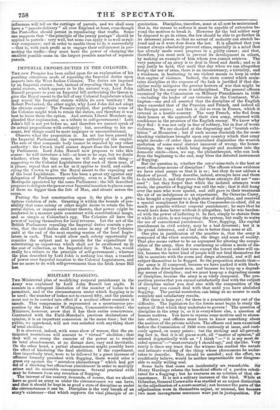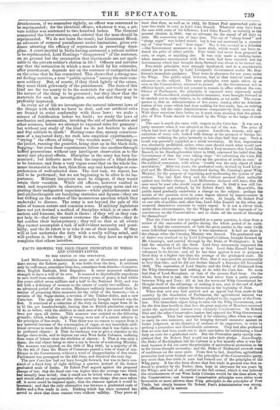MILITARY FLOGGING.
Taraa Ministerial plan of modifying corporal punishment in the Army was explained by Lord John Russell last night. It consists in a stringent limitation of the number of lashes to be permitted, and of the circumstances under which flogging is to be used ; the number of lashes not to exceed fifty, and the punish- ment not to be carried into effect if a medical officer considers it unsafe. This compromise is represented as a spontaneous pro- position by the Duke of Wellington, Commander-in-chief: the Ministers, however, avow that it has their entire concurrence. Contrasted with the Field-Marshal's previous declarations of opinion, it is an important concession in the mean time ; but the public, we apprehend, will not rest satisfied with anything short of total abolition.
It is observed, indeed, with some show of reason, that the an- ticipated restrictions will amount to " virtual " abolition ; that they will so cramp the exercise of the power as to render its total abandonment, at no distant date, easy and inevitable. On the other hand, a partial abandonment might possibly have the effect of hindering the final abolition. If the experiment, thus imperfectly tried, were to be followed by a great increase of Offences formerly punished with flogging, there would arise a .great cry against the " mistaken philanthropy" which had got ad of a shocking but efficacious punishment in order to multiply Crime and its miserable consequences. Several practical evils Ailey be foreseen from any retention of flogging.
The interest of the country demands, of course, that we should have as good an army as under the circumstances we can have, and that it should be kept in as good a state of discipline as under he circumstances it can be. Discipline is the very breath of an army's existence—that which supports the vital principle of or- ganization. Discipline, therefore, must at all cost be maintained that is, the means to enforce it must be capable of extension be- yond the motives to break it. However far the bad soldier may be disposed to go in crime, the law should be able to go further in its deterrent power, so that no extent of audacity can stretch be- yond and as it were dare down the law. It is admitted that you cannot always absolutely prevent crime, especially in a mind that has already made some progress in a guilty career ; and that, therefore, you must seek to prevent its development in others, by making an example of him whom you cannot retrieve. The very purpose of an army is to deal in blood and death ; and so it may justly be held, that until that day when we can altogether forego the use of arms, there is an inconsistency, a triviality, and a weakness, in hesitating to use violent means to keep in order that engine of violence. Indeed, the stern control which main- tains discipline at the expense of the lash is justified if that dis- cipline really mitigates the greater horrors of war that might be inflicted by the army were it undisciplined. The general officers examined by the Commission on Military Punishments in 1836 —including the leader of our victories on the Continent, Wel- lington—one and all asserted that the discipline of the English army exceeded that of the Prussian and French, and indeed all the foreign armies ; and that it did so even in France, which it entered as a hostile country. The very French, who fled from their homes at the approach of their own army, returned with confidence in the presence of the English enemy. We know why- they fled : it was not only in fear of robbery, but in fear of worse violences. We are shocked at the disgusting and "brutish exhi- bition" at Hounslow ; but if such means diminish the far more shocking visitations brought upon any country which that army might invade—if order thus maintained diminishes the wanton spoliation of some rural district innocent of wrong, the house- burnings, the rapes which bring despair and madness into the domestic circle—then, we say, the philanthropist, who can look from the beginning to the end., may bless the detested instrument of flogging. But the question is, whether the cat-o'-nine-tails is the best or most efficacious means of discipline ? The officers whose evidenee we have cited assure us that it is so ; but they do not adduce a shadow of proof. They describe, indeed, attempts here and there to do without it, and they prove that those attempts did not "sue.. ceed" : but they forget that while the isolated attempts were made, the practice of flogging was still the rule' that it still hung over the men who were• spared, and still gave to their treatment the air of an indulgence or an experiment. Sir Octavius Carey, who brought a regiment to a high state of discipline, and received a special compliment for it from the Commander-in-chief, did as much as possible without corporal punishment; he says that he would have done better without it altogether, but he was burden- ed with the power of inflictingit. In fact, simply to abstain from it while it exists, is not improving the system, but really to waive the use of correctional punishment. Now, flogging, like capital punishment in civil society, may be a bad deterrent; but it is the grand deterrent, and a bad one is better than none-at all.
One plea in justification of the practice is, that the army is composed of the vilest materials, the dregs and scum of society. That plea seems rather to be an argument for altering the compo- sition of the army, than for continuing so odious a mode of dis- cipline. But it is said that none except the lowest orders will en- list, because the better kind of people will not bind themselves for life to associate with the scum and dregs aforesaid, and will not subject themselves to be flogged. So the proposition stands thus— the army is ill composed, because we have packed it with black- guards who deter honest men, and because we keep up a degrad- ing means of discipline; and we must keep up a degrading means of discipline, because the army is so vilely composed. The pro- position proves that you cannot satisfactorily deal with the subject of discipline unless you deal also with the composition of the army; but you cannot deal with that until you have abolished flogging. The partial restriction can bring us no nearer to such complete and satisfactory results.
But there is hope yet; for there is a practicable way out of the difficulty. The legislators for the forces must begin to study the nature of that which they undertake to govern I The question of discipline in the army is, as it is everywhere else, a question of human motives. You have to repress some motives and to stimu- late others ; and officers must learn to know something about the motives of the private soldiers. The officers and men examined before the Commission of 1836 were curiously at issue, and curi- ously agreed, on many points ; but the striking and all-pervad- ing fact is, that it is all guess-work, all "matter of opinion," all uttered dogmatically with an "I think" — " it is my meal de cided opinion"—" most certainly I should say," and the like. Very rarely is there any trace that the witness has studied the nature and intimate working of the thing whose phwnomena he under- takes to describe. This should be mended ; and the effort, we confidently believe, would be neither impracticable nor disagree- able to really willing zeal.
Some facts that come out incidentally are remarkable. Sir Henry Hardinge relates the beneficial effects of a pardon substi- tuted for a flogging ; but he ventures on no solution of that cir- cumstance. It is not a solitary instance of the kind. While at Gibraltar, General Cornwallis was startled at an unjust distinction in the adjudication of a court-martial; not because the parts of the • adjudication were in themselves unjust, or unusual, but becatuie two most incongruous sentences were put in juxtaposition. For
drunkenness, if we remember rightly, an officer was sentenced to be reprimanded ; for the identical offence whatever it was, a pri- Vate soldier was sentenced to two hundred lashes. The General Commuted the latter sentence, and ordered that the man should be reprimanded. We do not learn the result; but Lieutenant Blood, an advocate of corporal punishment under limitations, gives evi- dence attesting the efficacy, of reprimands in -preserving disci- pline. A court-martial in India having sentenced a private soldier to be reprimanded, Lord Hastings "disapproved" of the sentence, on no ground but the assumption that reprimands are not appli- cable to the private soldier's station in life! Officers and privates my- that the estimation in which a man is held by his comrades, after punishment, depends not on the sentence or castigation but on the crime that he has committed. This shows that a strong mo- ral feeling survives, a true "public opinion" among the rude com- mon soldiery. But, of course if they think lightly of the crime,
they must think grievously of punishment. The facts of this kind are far too scanty to be the materials for any theory as to the nature of the thing to be governed ; but they show that the materials for such an investigation exist, and that they may be profitably improved. In every act of life we investigate the natural inherent laws of the things with which we have to deal, and our artificial rules are framed in strict conformity with those laws : we make a science of fortification before we build ; we study the laws of mechanics and pneumatics invoking the aid of mathematics and
other sciences, before we pneumatics, to expound rules for gunnery : but without any study of the kind we do not hesitate to shoot and flog soldiers to death! Having some dim, uneasy conscious- ness of a neglected duty, we rush into empirical experiments,— " trying " the effects of riding "the wooden mare," standing on the picket, running the gauntlet, being shut up in the black-hole, flogging : but even these experiments follow one another through baffled generations without any intelligent observation as to the moral and physical effects. Discipline in the army has been hu- manized; but hitherto more from the impulse of a blind desire to be humane, and from a very vague sense that on the whole hu- mane treatment is the best, than from any real knowledge or com- prehension of well-selected data. The real task, we repeat, has still to be performed ; but we are beginning to be alive to its im- portance. Military lawgivers must be diligent, if they would retain their vocation. While old officers, however exalted in rank and respectable in character, are comparing notes and re- peating their undigested experiences—while philanthropists and anti-philanthropists are bandying statistics and figures—they axe but trifling on the surface of the momentous question which they undertake to discuss. The army is not beyond the pale of the rules of human nature and common sense. If military legislators have not yet devised a method of discipline which is at once effi- cacious and humane, the fault is theirs : if they tell us they can- not help it—that they cannot overcome the difficulties—they do but confess their incompetency ; they tell us that at all events they cannot accomplish a task of self-evident necessity and possi- bility, and the fit retort is to take it out of their hands. If they will at last undertake the duty with a really willing mind, and will perform it, let them ; if they do not, they have no right to complain that others interfere.



























 Previous page
Previous page